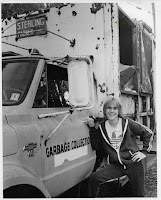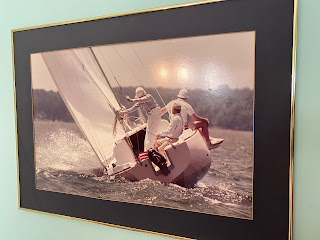 |
| Collecting garbage. Photo by Tom Franklin |
I have never been unemployed since I started my first job at
age thirteen. The pandemic, a couple of
underlying conditions, and a “Stay at Home” order changed that. On Friday I filed
for unemployment. Since I am
self-employed as an independent contractor, I would not have qualified to
receive unemployment under the old rules, but fortunately Congress added a
provision that covers contractors and gig workers. Filing for unemployment got me thinking about
my past jobs. I am thankful for each one of them. Even the ones that weren’t
the greatest because I learned something new with each one.
Way back in 1976, my family moved from Charlotte to Lake
Norman. We had been camping there for years on a leased campsite in Outrigger
Harbor. Outrigger was a combination marina and tiki themed family campground.
There was a tiki themed restaurant called, wait for it…
 |
| Lake House 1976. Photo by Tom Franklin |
“The Tiki Terrace!” The owner, Mr. Buck Teague, had also acquired an
old barge and built a full kitchen and tiki themed dining hall on it. It had
spiral stairs that lead to an upper deck pilot house. The captain would take
groups on dinner cruises on a very different Lake Norman than the one you may
know now. In the evenings the little outboard motor that powered the barge
named “The Outrigger” would be the only noise, besides the ducks and geese,
heard from the surrounding shores. I loved the place and knew that as soon as I
was old enough, I would apply to work as the attendant on the gas dock.
 |
| Me and Mom at Outrigger Campsite. Photo by Tom Franklin |
I was eager to start saving money so that I could buy a car as
soon as I turned sixteen. My father talked to Mr. Teague and he explained that
at age thirteen, I was too young to work on the gas dock yet. That job was
currently filled by a high school-er named Sam Wallen. However, Sam needed help with
some of his other duties and also needed to start training his replacement
since he would be off to college the following year. Dad took me to the Social
Security building in Charlotte where I applied for a work permit. I was allowed
to work up to twelve hours per week. I was excited, even though the law also
allowed my employer to pay me less than minimum wage because I was under
sixteen. I started at $1.85 per hour.
 |
| Photo by Tom Franklin |
I was paired up with Sam for the entire summer. Summers, and
especially weekends, were very busy at Outrigger. I learned pretty quickly that
my job was to be a jack of all trades. If it needed to be done, then Sam and I
did it. Sam ran the gas dock on the weekends, but his other duties were done
before and after opening the docks, as well as throughout the week. The two main parts of my job were cleaning
the campground bathhouses and collecting the garbage from the campsites. I had
barely been there a week when Sam told me it was time for me to learn to drive
the garbage truck! I thought he was
joking. Sam was a very smart guy, so I was certain he knew that I was not old
enough to drive! But Sam was a young
Libertarian and he explained that regular rules of the road did not apply,
because the entire place was on private property. America the beautiful!
The garbage truck had a manual transmission. Sam said the
best way to learn to use the clutch was starting from a dead stop while on an
incline. He had parked on a moderately steep hill and left the hand-pulled
parking brake on. Sam sat in the passenger seat beside me. He gave very clear
instructions: Step lightly on the gas. Slowly let the clutch out until you
feel the point of friction.
Wait! I had no idea what that meant. Sam said that I will
know it when I feel it. He was right.
Back to the lesson: Hold the gas and the clutch at the
point of friction. Notice how it feels. While continuing to hold at the point
of friction, release the parking brake. If the truck starts to roll backwards,
then give it a bit more gas while holding position on the clutch until you find
the point of balance.
Hold on again! What
does that mean? Sam said I would know when the truck stopped rolling backwards
but did not move forward either. I was starting to get nervous. What if I just
kept rolling backwards right into the lake, or one of the sailboat owners’
Jaguar or Mercedes? Sam said not to
worry. He would pull the parking brake if needed. It took several tries in
which either Sam had to pull the brake, or I stalled out the engine. But when I
got it, I had it. It was like magic. I had the power to make this giant garbage
truck balance under my command! The rest came easy. Sam was the best driving
instructor I ever had.
I spent that summer driving the garbage truck, while Sam
rode on the sideboard. He would hop off when I stopped at groups of trash cans.
He’d run and collect from one side, while I grabbed the bags out of the cans
along the other side. The trash cans were 55-gallon drums with holes punched in
the bottom so that water would not collect in them. They had metal lids that
were heavy enough to stay in place most of the time. We would throw the smelly
bags of garbage into the open sliding doors on the back of the truck. Then we grabbed new bags and put them in the
barrel. We secured them with a special way of looping the excess bag into a
knot that cinched tightly on the drum.
Outrigger Harbor had another truck that we used every day.
It was an old mail truck. A Jeep TP40. It had a roll-up door on the back. The
back was filled with cleaning supplies, toilet paper, and plungers. They called
it “The Tidy Wagon.” And that is what we
did. We drove the old mail truck to each of the four bathhouses and tidied them
up. We actually did more than tidy up. We scrubbed them. We cleaned all the
toilets twice a day. We scrubbed the showers. We detailed the sinks. Mr. Teague said he wanted the toilets so
clean that he could eat soup out of them! If anything was stopped up, we
plunged it. Sam taught me how to adjust the jets on the tank-less toilets if the
flush was too weak or too strong. Another lesson in balance.
There was always plenty of work to do. Cutting grass,
washing windows at the Tiki Terrace, using a sling to clear the weeds from the
shoreline. It was a great job. I loved
most everything about it. I continued to work on the weekends once school
started. Sam left for college the next year, so gas attendant was added to my
responsibilities. I continued working there until my second year in high
school. My friend Brian joined me the next summer. I taught him to drive a manual
transmission just like Sam had taught me. The summer after that my older
brother, Randy worked with me. I also taught him how to drive a stick drive
using “The Sam Wallen Method.”
 |
| Dad shot this during Outrigger's annual regatta. |
By the time I was sixteen, I had saved $2,250. I spent every
last dime on the worst car ever made by Audi, a special edition 1978 Fox with
gold pinstriping and the words “Blue Fox” written in gold script on each side!
But that is another blog post.
 |
| Photo Dad took at Outrigger Harbor. |
Those were magical days filled with honest work. I learned something about the value of labor and just how much work it takes to save a little money. And now I am stuck at home.
For the first time since getting that work permit,
I have no choice but to sit things out a bit.
I’ll be back in the game soon enough.










